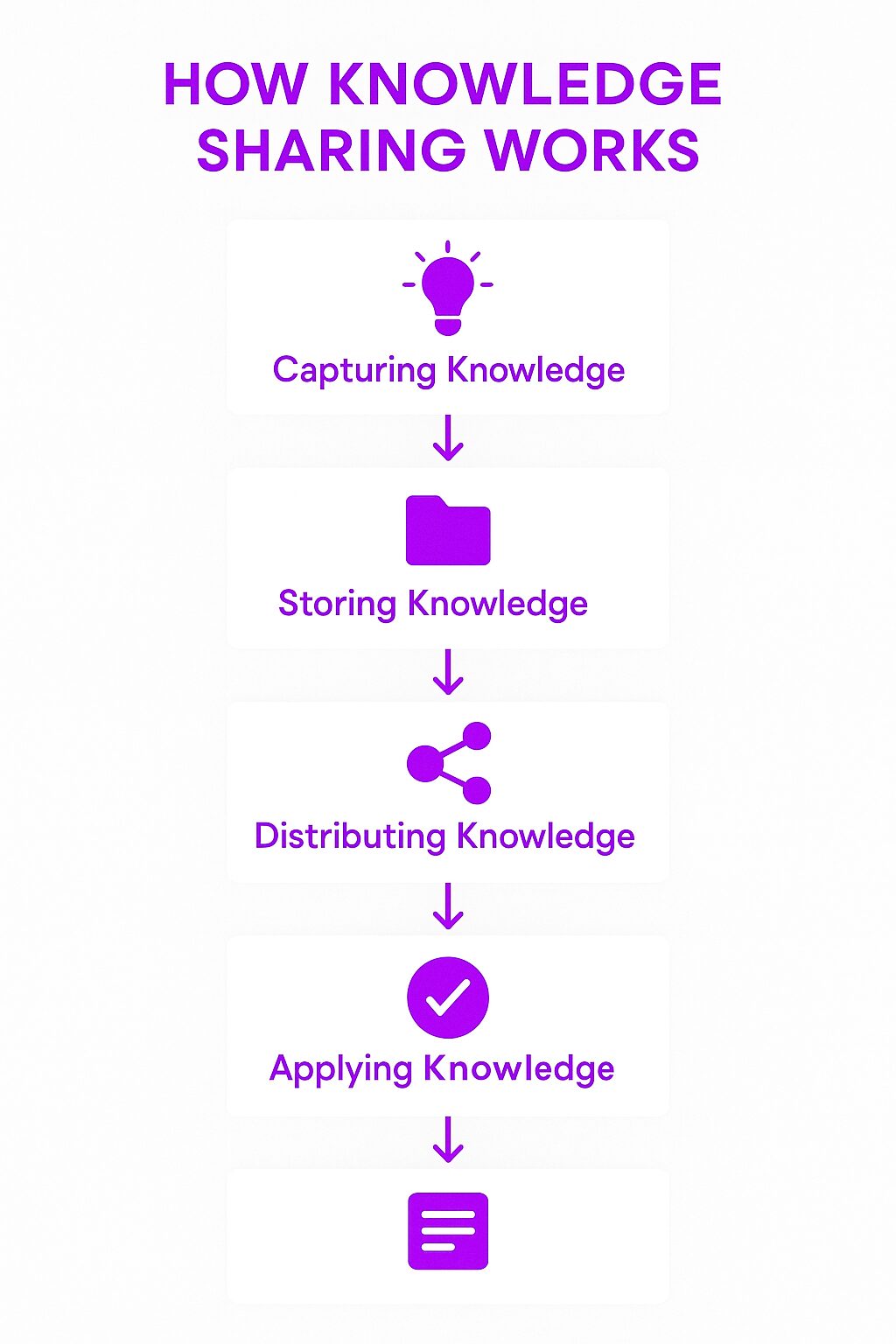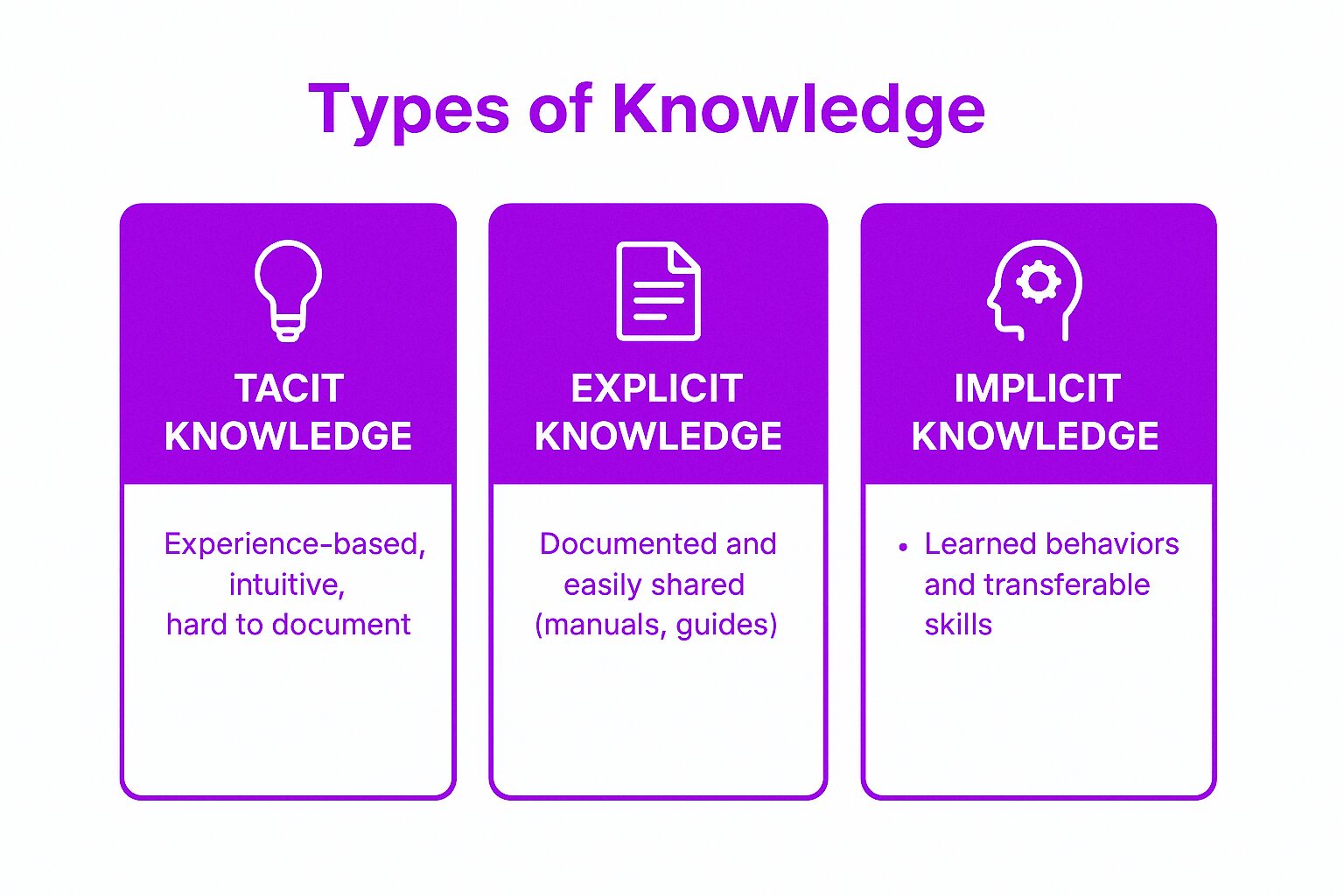What Is Knowledge Sharing?
Knowledge sharing is the process of exchanging information, skills, and expertise between individuals, teams, and departments within an organization. It enables employees to learn from one another, collaborate effectively, and build a more informed workforce. Encouraging knowledge sharing among employees increases the collective knowledge, fostering a culture of collaboration and continuous learning, which ultimately drives organizational success. Unlike simple data storage or documentation, knowledge sharing is an active process that encourages continuous learning and improvement.
Companies that invest in knowledge-sharing practices create an environment where employees feel empowered to contribute their insights. This process helps prevent information silos, improves decision-making, and fosters innovation.
How Knowledge Sharing Works

Knowledge sharing occurs in multiple forms. It can be informal, such as casual conversations between colleagues, or structured, such as documented best practices and training programs. It involves:
-
Capturing Knowledge: Gathering insights from employees through documentation, meetings, and recorded discussions.
-
Storing Knowledge: Using knowledge bases, intranets, or cloud-based platforms to store information.
-
Distributing Knowledge: Sharing information through meetings, workshops, wikis, or collaborative tools.
-
Applying Knowledge: Encouraging employees to use shared knowledge in their daily tasks.
Technology plays a significant role in knowledge sharing today. Digital platforms, such as enterprise intranets, collaboration tools, and knowledge management systems, enable organizations to document and distribute information efficiently. An effective knowledge sharing system is particularly important in the context of remote work and distributed teams, as it ensures that all employees have access to the information they need to perform their tasks effectively.
Why Knowledge Sharing Matters
When employees share knowledge, they help build a more connected, informed, and productive organization. Knowledge sharing improves:
-
Collaboration: Employees work better together when they have access to the right information.
-
Problem-solving: Teams can make faster and better decisions with shared knowledge.
-
Employee Development: New hires and junior employees learn more quickly from experienced colleagues.
-
Innovation: Sharing ideas leads to creative problem-solving and new business opportunities.
-
Business Continuity: Prevents loss of expertise when employees leave the organization.
Encouraging knowledge sharing is crucial for fostering a successful workplace culture. It leads to improved decision-making and innovation while addressing barriers to effective knowledge exchange.
Organizations that do not encourage knowledge sharing risk losing valuable expertise, increasing inefficiencies, and creating barriers to innovation.
Types of Knowledge in Organizations
Tacit Knowledge
Tacit knowledge is the personal experience and insights that employees gain through their work. It is difficult to document but essential for decision-making and problem-solving. Examples include:
-
Leadership intuition.
-
Hands-on technical expertise.
-
Industry-specific best practices.
Explicit Knowledge
Explicit knowledge is structured, documented, and easily shared. It includes:
-
Training manuals.
-
Reports and presentations.
-
Process guidelines and SOPs.
Implicit Knowledge
Implicit knowledge falls between tacit and explicit knowledge. It involves learned behaviors and skills that are not formally documented but can be transferred through mentorship and practical application. Knowledge transfer is crucial in this context, as it ensures that critical know-how is effectively communicated from departing employees to those who remain, maintaining organizational continuity and promoting a healthy work culture.
Benefits of Knowledge Sharing
Faster Decision-Making
When employees have access to the right information, they can make informed decisions quickly.
Reduced Redundancy
Employees avoid duplicating work when they can leverage existing knowledge and best practices.
Increased Employee Engagement
A culture of knowledge sharing encourages employees, fostering an environment that enhances job satisfaction and retention rates. This approach builds trust, collaboration, and professional growth.
Stronger Organizational Culture
When employees share insights openly, it strengthens company culture and encourages transparency.
Improved Customer Service
Support teams that have access to shared knowledge can resolve customer issues more efficiently.
Challenges in Knowledge Sharing
Resistance to Sharing
Some employees may hesitate to share knowledge due to job security concerns, lack of recognition, or knowledge hoarding, which can be a significant barrier to knowledge sharing within organizations.
Lack of Proper Tools
Organizations that do not invest in knowledge management systems may struggle to store and distribute information effectively.
Information Overload
Employees may feel overwhelmed by excessive or irrelevant information, making it difficult to locate useful knowledge.
Organizational Silos
Departments that operate independently may not prioritize cross-functional knowledge sharing, leading to inefficiencies.
Best Practices for Effective Knowledge Sharing
Create a Knowledge-Sharing Culture
Integrating knowledge sharing into a company’s culture is essential for its success, as it fosters a supportive environment that encourages participation and rewards efforts. Encourage employees to share insights through mentorship programs, team meetings, and open discussions.
Implement the Right Tools
Use intranet portals, cloud storage, and collaboration platforms to facilitate knowledge sharing by providing employees with the right tools to support effective information exchange.
Recognize and Reward Contributors
Acknowledge employees who actively participate in knowledge sharing by offering incentives, public recognition, or career advancement opportunities.
Encourage Cross-Department Collaboration
Facilitate interdepartmental projects, brainstorming sessions, and workshops to promote knowledge exchange. Clearly defining roles for team members can enhance engagement in these knowledge management processes, ensuring that everyone understands their responsibilities and contributes effectively.
Provide Training and Support
Help employees understand the value of knowledge sharing and teach them how to use knowledge management tools effectively.
Related Concepts
Knowledge Management
A broader discipline that includes knowledge sharing, storage, and retrieval to improve organizational efficiency.
Organizational Learning
The continuous process of knowledge acquisition, dissemination, and application within a company.
Internal Communication
A structured approach to information flow that supports knowledge sharing across an organization.
Real-World Examples of Knowledge Sharing
A Technology Company’s Internal Wiki
A global tech company implemented an internal wiki where engineers document solutions to technical problems. This reduced troubleshooting time and improved team collaboration.
A Retail Chain’s Employee Training Platform
A multinational retail brand introduced a digital knowledge-sharing platform for employees to access training materials, emphasizing the importance of knowledge sharing activities that are essential for employee development and operational consistency.
A Consulting Firm’s Best Practices Database
A consulting firm created a repository of successful case studies and methodologies, allowing teams to leverage past experiences for better client outcomes.
Final Thoughts
Knowledge sharing is essential for organizations that want to stay competitive, innovative, and collaborative. By creating a culture that values information exchange, investing in the right tools, and encouraging employees to contribute their insights, businesses can unlock their full potential. A well-executed knowledge-sharing strategy leads to improved decision-making, stronger teamwork, and better overall performance.





